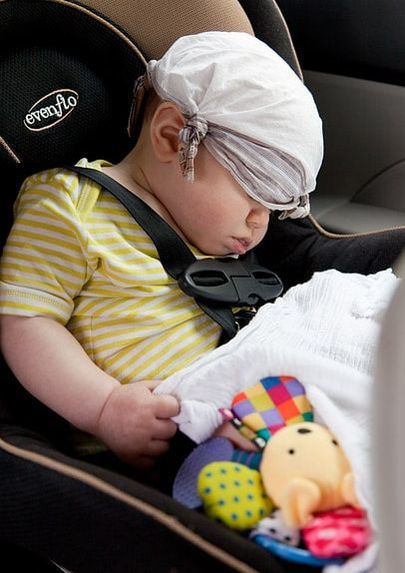
I explained that I call this phenomenon "Childhood Spectrum Disorder", which isn't really a diagnosis, but an observation after working with 1200+ families over 24 years in private practice.
At times, our kids look and act more like our parents or our siblings and maybe, a touch of grandma and grandpa! This is because the 50% that each parent donates to a child is not the same 50% each time.
The Mother (Nature, that is) operates this way in order to ensure the survivability of the species. Those traits that increase survival are passed down.
At times, this "genetic conflict" can result in poor "goodness of fit" between parent and child. If you're high energy and your daughter is a "Buddha" personality, there may be clashes.
Now, if your child looks like or acts like the brother you don't like because he tormented you in childhood or the sister who always put you down and was uber-competitive, watch out. Your feelings about these siblings may slop over onto your relationship with your child.
Know that, as the years go on and experience and maturation change them, they may not resemble their childhood selves. Don't take the cake out of the oven before it's done. Give them a chance to become who they're supposed to be and it's not your brother or sister.
Be aware of your potential prejudices, look for the positives in each kid, and like every other parent, take a different approach when interacting with each kid.
Give these three brief articles a look:
You Marry the Gene Pool
Mom Liked You Best!
You're All Talk...Your Tuned Out Kids
These treats are cheap, readily available and are very appealing to the adolescent palate.
You can't control everything your kid eats, especially once they get mobile in their mid-teen years.
Outline the real dangers of eating too much of these snacks. Teach them how to read the serving size information.
If Frito-Lay and other companies would stop making this garbage, we wouldn't have to worry about it, but you and I know that's not gonna happen. Ugh.
I wrote a blog post about it after a "call in" to a radio station on Thursday morning. This is the content from that blog post.
This content tells you "why" it happens and ways to prevent it. This is a completely preventable form of infant death. You're not immune.
I blame the digital age for pushing us over the edge. There's no room in our brains for anything else. Too much noise. Too many "demands" for our attention. People can reach you anywhere at any time. Not healthy. Here's the bottom line.
- On average, 37 kids die every year from being left in a car.
- Most deaths occur in July and August, so we’re right in that period.
- Kids don’t stay babies forever.
- Once they can be advocates for themselves, they can get your attention.
- You need to appreciate that you’re in an intensely stressful time of life, so you have to up your game. DO NOT TRUST YOURSELF.
It's no mystery. We're clear on "why" this happens.
- When parents forget their kids in the car and walk away, it’s usually under “different circumstances”. This means that they’ve varied their routine somehow and their “habit memory” which is our “autopilot” is engaged.
- Habit memory is the result of repetition and the more frequently the habit is repeated, the stronger it is.
- Think automaticity. You don’t even have to think about how to spell your name unless you’ve had a head injury or your substance impaired.
- Neurons (brain cells) that fire together, wire together creating the "practice makes perfect" dynamic. As you know, habits are tough to overcome.
- Donald Hebb, Canadian psychologist in the 60’s observed this dynamic.
- Stress and sleep-deprivation set us up for “defaulting” to our habits.
- Sleep loss and stress compromises our “prospective memory”.
- Prospective memory involves planning and intending to do something. Makes sense, right?
- Executive functioning skills associated with monitoring behavior, planning and controlling basic daily tasks are at play here.
- Executive functioning skills take place in the area behind the forehead.
- Also, the hippocampus is involved.
- The hippocampus is usually thought of as being primarily involved in memory, but its got more jobs than that. It's involved in the decision-making process.
- The hippocampus forms, organizes, multi-tasks and stores new memories. So, if you've changed routines "just for today", this system falters.
- These systems are sensitive and fragile and when you’re not cranking on all cylinders, they can break down.
- What to do?
- As soon as you realize that your schedule is going to be different, stop what you’re doing and create an alarm or alert on your phone.
- Leave yourself a voice mail message.
- Email yourself.
- Text yourself.
- Put a note on the door for when you leave in the morning. Put notes in the car.
- Create a "lanyard" and hang around your neck.
- Make a fun hat with things hanging down.
- Put a rubber band on your wrist.
- Every time you process the alert, the alarm, the voice mail, the email, the text and the note, you have a better chance of overcoming the automaticity of habit memory.
- Increase the size of the team. Have grandma call, have grandpa call, have your friends call you to make sure you took baby to daycare and she's not in the back seat.
- Use any and all available technology. Waze, the free, downloadable app has a child reminder option in the General Settings...do it, do it now.
- Educate yourself as to what happens to children left in cars. This information will change your perception of “what” happens.
- Kids bodies heat up much faster than adults and their organs begin to shut down when their core temperature reaches 104 degrees.
- What that means is that on an 86-degree day which is not all that hot, it takes about 10 minutes for the car temperature to reach 105.
You think this won't happen to you? YOU'RE WRONG. We love you. You can't live with the consequences.
Want more information? Go to noheatstroke.org. You'll learn everything you need to know, but didn't want to know.
The articles describe the families as being wealthier and being more highly educated.
Now, all of this gets a bit muddy because gender has traditionally related to sexual preferences. Science has now told us that there are many variations on this theme. But, here's what we think we know (how's that for a qualifier?):
Gender identity was first discussed in 1955, so nothing new. Kids as young as 18 months describe themselves as being "boy" or "girl" typically based on their genitalia. By age 4, their core gender identity is set and is difficult to change or influence. They make statements about their gender and then, begin to choose activities associated with their gender.
This process of choosing activities associated with their gender is called gender role and continues throughout life. Gender roles are observed as early as 3 years.
Finally, gender constancy is the child's understanding that gender is permanent despite the clothes people wear. This is typically achieved by age 7 years.
We now have a number of people who are developing groups and giving themselves names and flags and outlining their needs. These folks no longer have to live separate lives. People have always been transgender, demi-sexual and all of the variations. It's just that they were hidden. It wasn't safe to them to "declare" themselves and tell their truth.
I am asking parents to consider the consequences of this decision about an intensely gender-neutral upbringing. I want them to be realistic about being able to achieve their goals.
I want them to ask tough questions about their motivations for putting their children on the "first wave of boots on the ground" in this ever-evolving social environment. You may be asking them to wage your battles. Is that fair?
How will your extended family handle this? Are you prepared to manage these potential conflicts?
How will you handle the confusion, potential bullying and perhaps, social isolation from the other children? You cannot micro-manage every interaction in the school setting. Of course, the option is to send your child to an intimate school setting that is like-minded where accommodations can be made.
The years spent in elementary school are much more "forgiving" than when the middle- and high-school years come along. Will you be able to accommodate your child throughout this time?
What happens when they're catapulted into the world of work? Are you hoping that significant changes will have taken place at that time and that an "all inclusive" atmosphere is commonplace? How will they cope?
The pendulum of social change swings wildly from one arc to another and settles somewhere in the middle. Change does not happen quickly. Oh yes, laws can guarantee certain rights, but laws do not change feelings or even behavior.
I recommend that every family take a broader approach and provide many different kinds of opportunities for your kids without judgment or assumptions about their skills or identity. It's all about not making predictions of "who" your kids will be, but let them explore those options through the opportunities you give them. It also means strongly advocating for them when they are told "No".
If they are burdened by being "targets", that anxiety will shape their trajectory in a way you might not have anticipated. The "unintended consequences" in life are very, very difficult to predict.
It will be a great day, indeed, when your son can be a fashion designer and your daughter a fighter pilot and no one has a second thought about it.
We're making progress.
Claudia
Join me on Facebook at Dr. Claudia McCulloch
At DrClaudia.net, click on the "Ask Me" button and send me a question.




